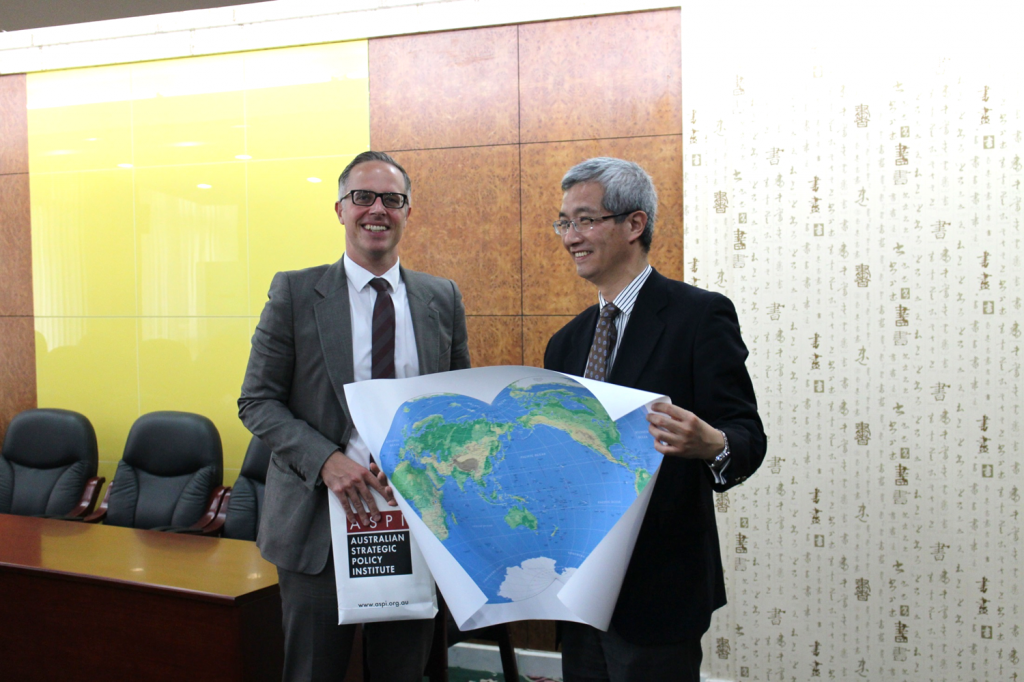‘We build too many walls and not enough bridges’ – Sir Isaac Newton
Having spent the last week in Beijing meeting with a range of think tanks, government officials and academics, I was struck by the importance our hosts placed upon the relationship with Australia. The concept used most frequently by the Chinese in relation to Australia was as ‘the bridge’ between China and the US. The Chinese clearly perceive an important role for Australia in evolving great power relationships, as well as viewing Australia as a nation with a strong regional role. Important as it is to be cautious about Chinese intent—and Australia has previously been reluctant to be cast in the role of a bridge—such positive sentiments should offer opportunities for future cooperation.
Obviously, recent cooperation on the search for missing flight MH-370 has assisted in building ties between the two nations. There was also an advantage to arriving in the wake of Prime Minister Abbott’s visit to China, which had focused predominantly on strengthening economic and security ties, and which had included proposals for closer cooperation in countering cyber-security threats and encouraging more frequent defence exchanges. That visit had clearly left a positive impression upon the Beijing policy community.
ASPI went to Beijing to discuss those announcements, along with how to progress practical work in those areas, but with a specific focus on the cyber aspects of Australia-China relations. This topic has so often been focused, for good reason, on the threat dynamics between our two nations, and less on practical measures for creating trust in cyberspace. Our engagement strategy was simple: to find common ground for bilateral cooperation, most significantly in the areas of sharing cyber policy experiences, growing confidence building measures at both the regional and bilateral levels, building our cyber capacities, and strengthening the role of the digital economy in our economic development.
At the national level, we found we shared many experiences, including problems in understanding where the division of labour lay between the responsibilities of government, the private sector and individuals in delivering cybersecurity. Even though we typically try to solve those problems differently, there was value in talking through that shared dilemma. In regards to governance structures, China is grappling with its own mechanisms (PDF) for delivering cyber security, and deciding which department is the most effective lead for domestic management of the issue. Coordinating cybersecurity responses has been problematic for China as inter-departmental power struggles play out; and it may well have been those struggles that persuaded Xi Jinping to establish the new ‘leading small group on informatisation and internet security’, which he chairs. Alternatively, Xi might simply be consolidating his central power—he has established a number of core groups that he chairs. From President Xi’s public statements we know he sees building China into a ‘cyber power’ as important, and his placement of Premier Li Keqiang and Liu Yunshan (both members of the Standing Committee of the Political Bureau of the Communist Party Central Committee) as deputy heads underlines that intent. It could also explain the enthusiasm we encountered for discussing cyber issues amongst Beijing’s elite policy community.
A number of Chinese counterparts queried Australia’s lack of a Cyber White Paper since 2009. True, the same question might just as easily be directed to China, which has no English-language policy document outlining its approach, and a lack of transparency on those issues. But the query shows China is observing what goes on in Canberra. A refreshed Cyber White Paper process is vital not only for Australia to clarify its own thinking, but to demonstrate that thinking and intent to other nations.
Against a backdrop of accusations of economic and political espionage, an increased dialogue on cybersecurity offers the prospect of identifying common ground upon which to build a better relationship, something I’ve highlighted (PDF) in the past. If there’s to be a Free Trade Agreement (FTA), it’s in both sides’ interests to be a predictable and reliable trading partner, and that includes having confidence that neither side is exploiting the cyber domain to advance its interests at the other’s expense. A key indicator of the potential signing of the FTA edging closer was Abbott’s discussions of the easing of restrictions on investment in Australia by Chinese state-owned corporations but what it is unclear how that might impact Chinese telecommunications and infrastructure companies. Specifically, there were enquires in our discussions as to whether this would prompt a reversal of the decision that Huawei not be allowed to bid for contracts to deliver aspects of the National Broadband Network in Australia. Still, we didn’t get the impression that this question would hold back the economic progress already being made between the two countries.
Clearly, some walls still need to be surmounted. Both nations have markedly different approaches to online privacy issues and content control for example. Australian nationals may complain that they feel spied upon, but the reality in China is far more acute. It was said during our meetings that China has a different interpretation as to what cybersecurity means. Most concerning from an Australian perspective was that China includes in its interpretation the ‘maintenance of political stability’—which in effect means controlling dissenting political voices online. There’ll be difficulties in overcoming the ideological differences there. But it’s imperative that it doesn’t stop practical cooperation between China and Australia which will build understanding between the two nations in the long term.
Tobias Feakin is a senior analyst at ASPI and director of ASPI’s International Cyber Policy Centre. Image (c) ASPI 2014.
